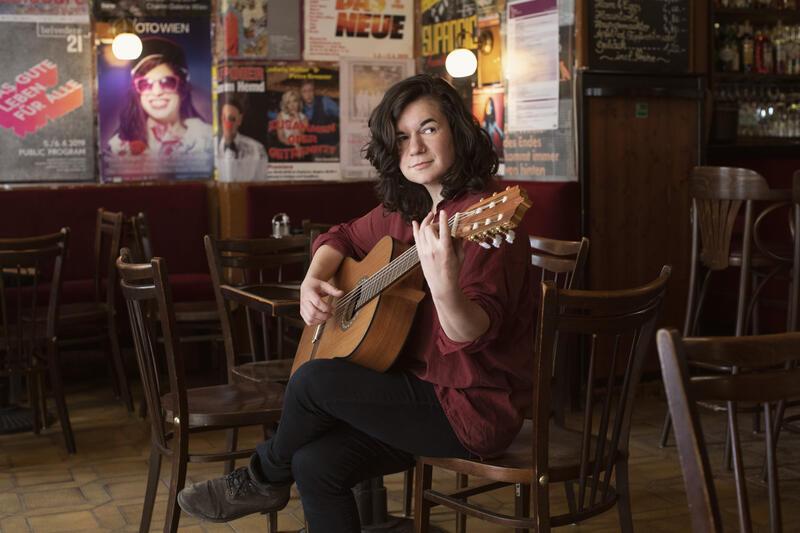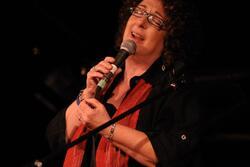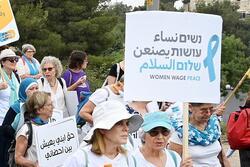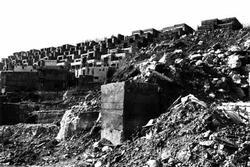Q & A with Isabel Frey, Social Justice Activist and Yiddish Singer
Isabel Frey is a social justice activist, Yiddish singer, and PhD candidate in ethnomusicology based in Vienna, Austria. Her debut album Millenial Bundist came out in 2020, and she recently co-founded Standing Together Vienna, a Jewish-Arab alliance for peace in the Middle East.
JWA: Can you describe your main current projects?
IF: I am both a musician and an academic: I perform regularly as a Yiddish singer in different projects and ensembles, and also curate and lead Yiddish culture festivals in Austria such as the Vienna KlezMORE Festival. I work and teach at the University of Music and Performing Arts Vienna, where I am currently finishing my PhD in ethnomusicology with a dissertation on the contemporary politics of Yiddish folk song. For many years I have been a social justice activist, but currently I am working mostly as an activist for peace, justice, and equality in Israel-Palestine—a topic that has always been very close to my heart.
JWA: What Jewish teachings inspire you as an activist?
IF: I am a secular Jew, so I’m guided less by religious teachings and more by the history of secular Jewish social justice and revolutionary movements. I grew up in the socialist-Zionist youth movement Hashomer Hatzair, and while I no longer identify as Zionist, I was very much inspired by the socialist ideals and by Jewish teachings such as tikkun olam, which were central values of the movement. I got interested in Yiddish music through a fascination with the history of the Jewish Labor Bund and its diasporist principles, such as “doikayt“ [here-ness], which became a central value for me as a diaspora Jewish social-justice activist.
JWA: Can you tell us about your group Standing Together Vienna, and the process of co-founding it?
IF: I started Standing Together Vienna together with the Vienna-based Israeli-Palestinian art collective One State Embassy. We’re not a chapter of the Israeli organization Standing Together, which only exists in Israel, but rather we’re deeply inspired by their work and try to bring their ethos into our local context. The reason for starting our own group here was because we felt it was missing in public discourse to have a space to mourn civilian victims from “both sides” and to call for a ceasefire and a deal to return the hostages immediately in the current war. We also wanted to show the diversity of people from affected diaspora communities living in Vienna and show that we will not let ourselves be divided by hate.
JWA: You helped organize a vigil on October 22 dedicated to “the civilian victims in Israel and Palestine and for peace, justice and security for all.” Why was this important to you?
IF: The vigil for all civilian victims in Israel and Palestine was our first action and also a kind of mission statement. We felt that we needed a space to come together and mourn all civilian lives lost in this war, and to continue to hold on to our vision for a peaceful coexistence of Jewish Israelis and Palestinians in the whole region, where everyone lives with equal rights and in safety. We also decided that the vigil would not have any flags or slogans, but only candles, and in addition to speeches we also had a music program with a mix of Jewish and Arab or other Middle Eastern diasporic music. The vigil was a huge success and we continued organizing them about every two weeks, with one time a thousand people attending.
JWA: Can you tell us about the speech you gave at the vigil?
IF: My speech was very personal about the process of growing up in a Jewish community in Vienna and unlearning some of the narratives that I had grown up with. I was part of the socialist-Zionist youth movement Hashomer Hatzair and grew up with my identity very much tied to Israel, without ever having heard the word “occupation.” During my gap year in Israel I visited the West Bank for the first time on a tour by Breaking the Silence, and from that moment everything changed for me and I became an anti-occupation activist. Then I spoke about how, since October 7, it seemed like any possibility for peace activism had closed down, also in my community. So I pointed to the necessity of building bridges of understanding and accepting each other's narratives, while allowing us to hold the pain and grief for both sides.
JWA: How do you navigate grief and maintain nuance in these difficult conversations?
IF: Sometimes it’s very challenging, because it seems like everything is currently pressuring you to take a side. But it’s so important to see through the dehumanization and understand that every single life lost is an immense tragedy. I’ve also been thinking a lot about this quote by Israeli activist Sahar Vardi, which my uncle sent me a few days after the October 7 massacre, and which I also quoted in my speech. She writes, “We, the left, are often accused of dual loyalty. And on days like this I really feel it.” And later: “…Loyalty may not be the right word. It's dual pain, dual heartbreak, care, love. It is to hold everyone's humanity. And it's hard. It's so hard to have humanity here. It's exhausting, and it feels like time after time the world is just asking you to let go. It's so much easier to ‘choose a side’—it almost doesn't matter which side. Just choose, and stick to it, and at least reduce the amount of pain you hold. And at least feel part of a group and less alone in all this. As if that's really an option. As if we don't understand that our pains are intertwined.”
JWA: As a scholar and performer of Yiddish music, are there any Yiddish songs that are speaking to you at this moment?
IF: The song that resonates the most with me at the moment is Adrienne Cooper’s (z’’l) “Sholem Lid [Peace Song],” her reworking of the Hasidic Shabbes nigun that became a peace anthem. I used to not fully understand why the song says so tentatively “Volt ikh gehat koyekh, volt ikh gelofn in di gasn, volt ikh geshrign sholem“ [If I had the power, I would run into the streets and call for peace], because I thought to myself, what is so difficult about calling for peace? Who can be against peace? But now I understand that sometimes calling for peace is the most radical act possible, and it requires a lot of courage. I also recorded the song on my album Millenial Bundist, and I performed it at one of our vigils.








